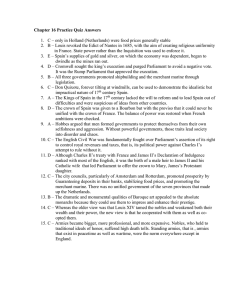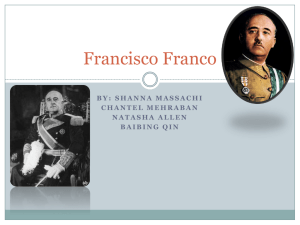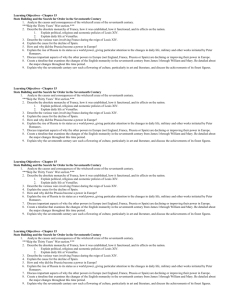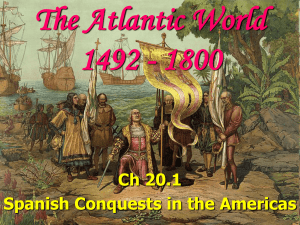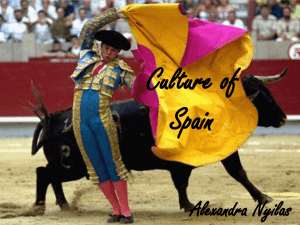Chap 16 Review Quiz
advertisement
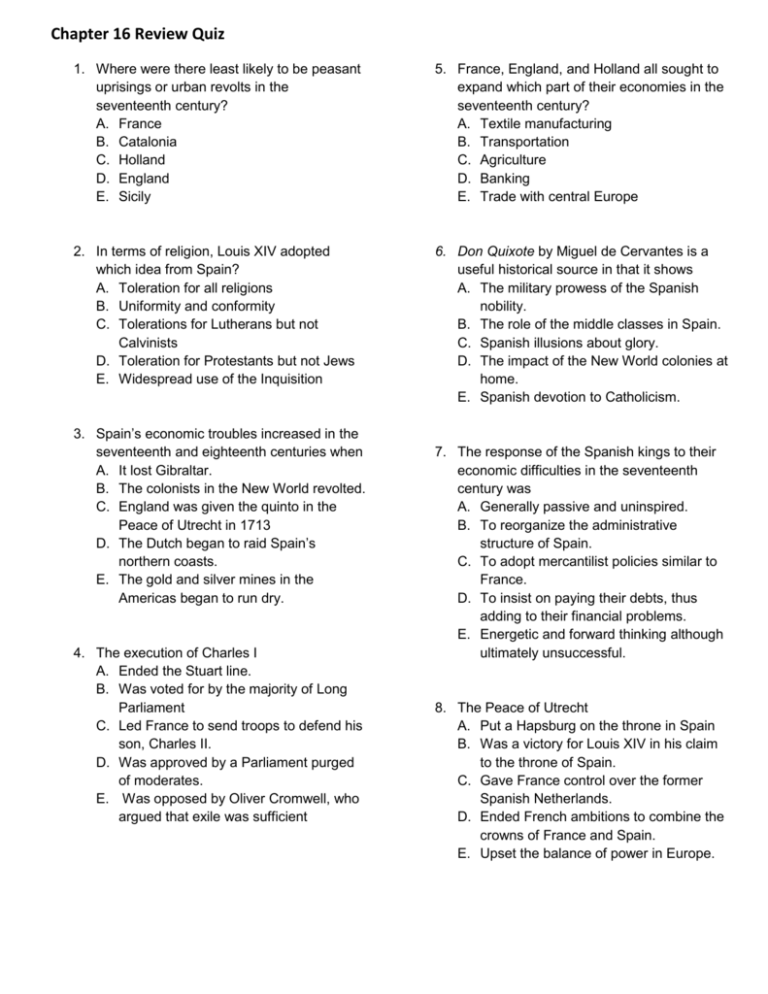
Chapter 16 Review Quiz 1. Where were there least likely to be peasant uprisings or urban revolts in the seventeenth century? A. France B. Catalonia C. Holland D. England E. Sicily 5. France, England, and Holland all sought to expand which part of their economies in the seventeenth century? A. Textile manufacturing B. Transportation C. Agriculture D. Banking E. Trade with central Europe 2. In terms of religion, Louis XIV adopted which idea from Spain? A. Toleration for all religions B. Uniformity and conformity C. Tolerations for Lutherans but not Calvinists D. Toleration for Protestants but not Jews E. Widespread use of the Inquisition 6. Don Quixote by Miguel de Cervantes is a useful historical source in that it shows A. The military prowess of the Spanish nobility. B. The role of the middle classes in Spain. C. Spanish illusions about glory. D. The impact of the New World colonies at home. E. Spanish devotion to Catholicism. 3. Spain’s economic troubles increased in the seventeenth and eighteenth centuries when A. It lost Gibraltar. B. The colonists in the New World revolted. C. England was given the quinto in the Peace of Utrecht in 1713 D. The Dutch began to raid Spain’s northern coasts. E. The gold and silver mines in the Americas began to run dry. 4. The execution of Charles I A. Ended the Stuart line. B. Was voted for by the majority of Long Parliament C. Led France to send troops to defend his son, Charles II. D. Was approved by a Parliament purged of moderates. E. Was opposed by Oliver Cromwell, who argued that exile was sufficient 7. The response of the Spanish kings to their economic difficulties in the seventeenth century was A. Generally passive and uninspired. B. To reorganize the administrative structure of Spain. C. To adopt mercantilist policies similar to France. D. To insist on paying their debts, thus adding to their financial problems. E. Energetic and forward thinking although ultimately unsuccessful. 8. The Peace of Utrecht A. Put a Hapsburg on the throne in Spain B. Was a victory for Louis XIV in his claim to the throne of Spain. C. Gave France control over the former Spanish Netherlands. D. Ended French ambitions to combine the crowns of France and Spain. E. Upset the balance of power in Europe. 9. Bossuet and Hobbs both supported strong governments but differed in their reasons. While Bossuet argued for divine right of kings, Hobbes based his views on A. Man’s selfish and aggressive nature B. Machiavellian ideas about the need for a prince to unify the nation. C. More’s ideal community in which government carefully supervised the population. D. A non-Christian idea of divine right. E. The analogy of the brain’s role in the body. 10. The English civil war was fundamentally fought over A. Catholic demands for the right to freely practice their religion B. Puritan demands for the right to freely practice their religion. C. Whether Parliament or the king would have the power of the purse. D. Whether the House of the Lords or the House of Commons should have ultimate authority. E. Whether Parliament of the king would appoint the head of the Anglican Church. 11. Which event prompted the Glorious Revolution? A. Charles II’s treaty with Louis XIV B. James I’s “The Trew Law of Monarchy” C. The death of Oliver Cromwell D. The birth to James II of a son and heir E. The Declaration of Indulgences granted by James II 12. One important factor in creating Dutch prosperity in the seventeenth century was A. Their political unity. B. Their alliance with the British. C. The active promotion of business by city councils. D. Important colonies in the New World. E. The establishment of constitutional monarchy. 13. Baroque art and architecture appealed to the absolute monarchies because of its focus on A. Focus on classical antiquity B. Drama and monumental size C. Intense religiosity D. Simplicity and understatement E. Rejection of the nude 14. Historians have changed their views on Louis XIV’s relationship with the nobility. They now say he A. Emasculated the nobles. B. Severely diminished the wealth of the nobles. C. Cooperated with the nobles. D. Successfully replaced the nobles with the bourgeoisie as the dominant political class. E. Ignored the nobles. 15. Armies changed in the seventeenth century in all of the following ways except that A. They became larger B. They became more professional C. Most soldiers were mercenaries, as few countries had standing armies D. The death toll was high particularly for officers. E. They became more expensive for kings to pay for

